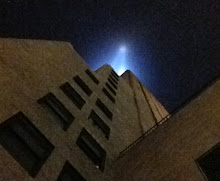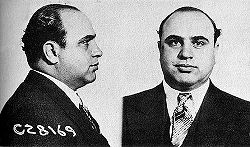Why Chicago is still Al Capone’s town
Chicago and Al Capone are linked more tightly than any other city and historical figure in America. Some memorable pairs do exist – Detroit and Henry Ford, New York and Boss Tweed, Philadelphia and Benjamin Franklin –but none are as vivid in the popular imagination.
For a while, Michael Jordan became the international symbol for the Windy City, but that’s faded since his retirement. If you mention to someone in Oslo or Tokyo or Cairo that you come from Chicago, you’re going to be greeted once again with a mimed tommy gun and “Ack-ack-ack-ack-ack-ack!”
It’s a lead-pipe cinch that this will become more ingrained with Jonathan Eig’s new biography, Get Capone: The Secret Plot that Captured America’s Most Wanted Gangster. The book, released today, has gotten rave early reviews from Publishers Weekly, Kirkus Reviews, and the Chicago Sun-Times, among others, for its gripping story and thorough research. Eig, who has written award-winning biographies of Lou Gehrig and Jackie Robinson, brings a journalist’s panache and a scholar’s eye to a larger-than-life criminal that everyone thinks they already know.
In an email exchange, I asked Eig about the role of Chicago in Capone’s epic rise and unprecedented fall.
Capone was not from Chicago, but actually New York. Was there really no place for him in NY, or was the Chicago market that appealing?
Capone was nothing but a two-bit thug when he left New York, so it’s not as if he expected to make it big here. In all likelihood, he left New York to get away from the cops, or from another two-bit thug who wanted him dead, or some gal he knocked up. He made the move in 1920, so no one yet imagined that Prohibition was going to make two-bit thugs rich and powerful. Like a lot of American icons, he was more lucky than smart.
Like Capone, you’re from New York. Is this any kind of coincidence, or is there something about Chicago that calls to you?
Like Capone, I’m from Brooklyn. Like Capone, I started losing my hair when I was a teenager. Like Capone, I try to make peace with my competition, but when all else fails I destroy them. OK, strike that last one. I think it’s the beer that calls me to Chicago. But the same probably could have been said of Portland or Dubuque.
Like Capone, I’m from Brooklyn. Like Capone, I started losing my hair when I was a teenager. Like Capone, I try to make peace with my competition, but when all else fails I destroy them. OK, strike that last one. I think it’s the beer that calls me to Chicago. But the same probably could have been said of Portland or Dubuque.
Capone was obviously ruthless and intelligent. Were there any other factors that contributed to his huge success? Could another mobster have become the face of corruption during Prohibition?
There were plenty of ruthless mobsters and quite a few intelligent ones. The key to Capone’s huge success–and to his failure–was his appetite for fame. He was the first and only celebrity gangster. He loved the spotlight. That’s why he became the model for Edward G. Robinson and all the other actors playing gangsters. That’s why he made the cover of TIME magazine. And that’s why, at least in part, the feds came down on him with such force. Capone was making them look foolish. Turns out there was a good reason the other big gangsters didn’t seek publicity.
Other cities (e.g., New York, Detroit, Kansas City) had violent criminal underworlds. Why did the “romance” of Capone last in Chicago for so many decades? Was it really the most corrupt American city back then?
Chicago was probably a little bit more corrupt than most cities, but that doesn’t really explain the city’s lasting reputation for gangland violence. Much of it has to do with Capone’s celebrity. Some of it has to do with the city’s great newspaper reporters, who loved Capone and loved making him out to be a kingpin. Even some New York reporters, like Damon Runyon, got in on the act. Finally, I think Chicago was just a great drinking town. It was so easy to drink here. The cops didn’t care. And there was speakeasies on practically every corner. That’s why they called it “that toddlin’ town.”
Yours will probably become the definitive Capone bio for some time. Did it surprise you that he hadn’t been covered extensively before?
It’s not that Capone wasn’t covered. Fred Pasley wrote the first Capone bio in 1930. It was pretty good. John Kobler wrote another good one back in 1971. Robert Scheonberg did nice work with a Capone book in 1992. But I wanted to put the man in historical context. I wanted to make him seem more human. I tried to strip away some of the varnish that came to cover his story. Also, I had a ton of secret government documents those guys didn’t get. But the bottom line, I guess, is this: I live in Chicago and I could see that Capone still towered over the city. Yet most people didn’t really know anything about him. I hope this book changes that.
What was in the government documents you obtained? Did they shed light on his character or clear up inconsistencies?
The government documents showed the feds had an incredibly weak case against the Big Man and they knew it. It showed that Capone had a legitimate claim when he said he was being persecuted. I also found Capone letters and interviews from Alcatraz that revealed much about his character. For example, when it came to his family, he was a big sap.
Around the Midwest, locations too numerous to count take a perverse pride in saying “Al Capone slept here.” Are most of these apocryphal?
Well, he slept a lot of places. But who knows? I’d still wager that 90 percent of all “Capone slept here” stories are in fact apocryphal. Every building in Chicago that has a coal chute claims it was a Capone escape tunnel. Every apartment with a turret window was a machine gun nest.
On the other hand, Capone and his men really did live and do business here. So it’s pretty cool to think he probably walked the street where I lived. And I pass the site of the St. Valentine’s Day Massacre almost every day. That’s why I created the Chicago Gangland Tour. It’s an iPhone app. You can use it to see where Capone really did sleep. And where his enemies slept with the fishes!
Did organized crime “learn” anything after Capone was convicted of tax evasion?
Yes. A lot of underworld figures learned to pay their taxes.







No comments:
Post a Comment